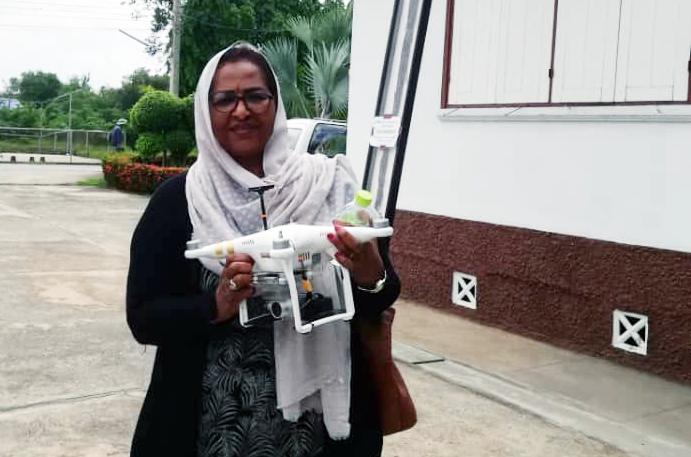Ms Intisar Ahmed SDG focal point and progrmme officer UNDP Sudan holding one of the phanotm Drones for the remote sensing experiment.
The transitional period of Sudan has become a symbol of hope for the people of Sudan and the diaspora community; however, the challenges that are facing the country will prove to be a huge obstacle for progress and development. The issues Sudan is tackling are protracted, wicked and complex for a country already in a state of fragility and vulnerability. With a newly appointed transitional government this past August, the issues and challenges are daunting; all the while citizen expectations are high for the government to show results in a short period of time. Moving away from business as usual, the demand created for quick results and high impact gives a great opportunity for the UNDP Sudan Accelerator Lab to innovate and experiment to generate learning around responsive governance.
Since September 2019, in our first 100 days to land the Accelerator Lab, the Accelerator Lab Team is structured within the framework of the Accelerator Labs Learning Loop Cycle to Sense, Explore, Test and Grow as part of our contribution towards building the world’s largest learning network to tackle 21st century development challanges. Our plan is to position the AccLab in the Transitional Period targeting over 8 SDGs, but our focus will be on SDG 9: Industry, Innovation and Infrastructure, SDG 16: Peace and Justice Strong Institutions and SDG 17: Partnerships to achieve the Goal. Our Head of Exploration and Solutions Mapping will take lead on the Sensemaking and the Exploration with support from myself, Head of Experimentation. After analyzing the trends and discovering local solutions, I will take lead on designing the portfolio of experiments though a contextualized framework with inputs from the Heads of Exploration and Solutions Mapping.
From Baby Steps to Moonshots
It was clear that the Acclab comparative strength is best leveraged towards supporting the transitional government in achieving its 21 identified priority areas announced in October from a strategic and systems thinking perspective. Although we will not support all the priority areas in the 100 days action plan that we developed, the Lab will work with the UNDP CO to support the following priority areas which will be covered in a blog series:
- Bridging the digital divide within the agricultural sector.
- Diaspora engagement
- Youth Engagement
Initially we had discussions with various stakeholders namely UNDP CO, Sudanese Professional Associations, mural artists, Think Tanks, diaspora technical experts, European Space Station, research groups, government counterparts, CSOs and NGOs and private sector to achieve these thematic areas. These thematic areas have existing initiatives within UNDP Sudan, and we will leverage the in-house knowledge and expertise to accelerate learning within our country office and transfer the knowledge to our counterparts. Our role as the Accelerator Lab was to identify entry points for these initiatives to accelerate development and learning. Our general assumption is if we unpack the complexity of the priority area issues then we will be able to disrupt the current system leading to a paradigm shift within development in Sudan.
Bridging the digital divide within the agricultural sector
An example of leveraging digital transformation to help agricultural and macro-economic performance, the AccLab will be experimenting on Drought and Crop Yield Monitoring.
We are collaborating with the environment and climate change team as an early traction for the AccLab on experimental methods to establish an early warning and a knowledge platform against climate change risks for small and medium farm owners of north and central Sudan. By obtaining crucial information on desertification, erosion, weather updates and best seed in the market farmers will make better decisions.
Our Hypothesis is, if we can monitor desertification and land erosion then farmers can make better decisions against weather-based indices comprising of series of indicators measured with high-tech weather monitoring systems. The experiment will also address the digital divide in Sudan and capacitate the government in digital transformation tools.
We are looking into strengthening monitoring mechanisms that utilizes advanced technology to measure land preparation, crop status and its yield from the farmland. The idea is to use drones to map the agricultural lands by installing remote sensors on the drones that will collect the data and provide farmers with information on better practices for planting, irrigation and evidence of claiming funds from insurance companies. All this information will be disseminated to farmers through mobile based application.
This application will also empower small land holder farmers to improve their yields, grow improved crops and make the most of their resources to increase crop productivity. The application will serve as a platform to connect small and medium farm owners with agricultural professionals providing technical advice through a live chat function where farmers can upload photos and ask questions to the agriculturists. The application will update timely weather information, insurance scheme and crop market values and provides access to suppliers and buyers. This ensures farmers can reach out to technical know-how, access to loan, market information and make informed right decisions for buying and selling for their products.

 Locations
Locations

